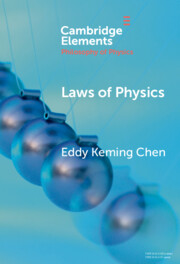385 results
Introduction
-
- Book:
- Migration at the End of Empire
- Published online:
- 30 May 2024
- Print publication:
- 06 June 2024, pp 1-32
-
- Chapter
- Export citation
3 - Ex Uno Plures
- from Part I - Creative Processes
-
-
- Book:
- The Cambridge Companion to Composition
- Published online:
- 25 May 2024
- Print publication:
- 30 May 2024, pp 42-61
-
- Chapter
- Export citation
Chapter 12 - Time and Eternity in the Consolation of Philosophy
-
-
- Book:
- Boethius’ ‘Consolation of Philosophy’
- Published online:
- 23 May 2024
- Print publication:
- 30 May 2024, pp 202-219
-
- Chapter
- Export citation

Laws of Physics
-
- Published online:
- 22 May 2024
- Print publication:
- 20 June 2024
-
- Element
-
- You have access
- HTML
- Export citation
Timing bombs and the temporal dynamics of Iranian nuclear security
-
- Journal:
- European Journal of International Security , First View
- Published online by Cambridge University Press:
- 29 April 2024, pp. 1-19
-
- Article
-
- You have access
- Open access
- HTML
- Export citation
Algorithmically generated memories: automated remembrance through appropriated perception
- Part of
-
- Journal:
- Memory, Mind & Media / Volume 3 / 2024
- Published online by Cambridge University Press:
- 29 April 2024, e11
-
- Article
-
- You have access
- Open access
- HTML
- Export citation
1 - Rousseau’s Sovereignty and the Concept of Constitutional Identity
- from Part I - Foundations, Theory, and Concepts
-
-
- Book:
- Deciphering the Genome of Constitutionalism
- Published online:
- 14 March 2024
- Print publication:
- 21 March 2024, pp 23-33
-
- Chapter
-
- You have access
- HTML
- Export citation
Political communication in the real world: evidence from a natural experiment in Germany
-
- Journal:
- Political Science Research and Methods , First View
- Published online by Cambridge University Press:
- 18 March 2024, pp. 1-16
-
- Article
-
- You have access
- Open access
- HTML
- Export citation
4 - Modes of Production
-
-
- Book:
- Human Behavioral Ecology
- Published online:
- 07 March 2024
- Print publication:
- 14 March 2024, pp 76-103
-
- Chapter
- Export citation
10 - Time and Treaty Interpretation
-
- Book:
- Demystifying Treaty Interpretation
- Published online:
- 07 March 2024
- Print publication:
- 14 March 2024, pp 199-232
-
- Chapter
- Export citation
2 - Construal in Language
-
- Book:
- Cognitive Linguistics and Second Language Acquisition of Chinese
- Published online:
- 01 February 2024
- Print publication:
- 08 February 2024, pp 9-39
-
- Chapter
- Export citation
4 - Adaptive Reflexive Individuals
- from Part II - Building a Socially Embedded Individual Conception
-
- Book:
- Identity, Capabilities, and Changing Economics
- Published online:
- 11 January 2024
- Print publication:
- 01 February 2024, pp 83-108
-
- Chapter
- Export citation
1 - A Theory of WTO Law
-
- Book:
- A Communitarian Theory of WTO Law
- Published online:
- 14 December 2023
- Print publication:
- 21 December 2023, pp 1-54
-
- Chapter
- Export citation
7 - Beyond Disciplinary Prediction
-
- Book:
- The Time of Global Politics
- Published online:
- 23 November 2023
- Print publication:
- 07 December 2023, pp 198-233
-
- Chapter
- Export citation
6 - Making America Great Again, Again, and Again
-
- Book:
- The Time of Global Politics
- Published online:
- 23 November 2023
- Print publication:
- 07 December 2023, pp 168-197
-
- Chapter
- Export citation
5 - The Time of War
-
- Book:
- The Time of Global Politics
- Published online:
- 23 November 2023
- Print publication:
- 07 December 2023, pp 143-167
-
- Chapter
- Export citation
1 - Theorizing with the Present
-
- Book:
- The Time of Global Politics
- Published online:
- 23 November 2023
- Print publication:
- 07 December 2023, pp 1-32
-
- Chapter
- Export citation
4 - The Temporality of IR Theories
-
- Book:
- The Time of Global Politics
- Published online:
- 23 November 2023
- Print publication:
- 07 December 2023, pp 100-142
-
- Chapter
- Export citation
Conclusion
-
- Book:
- The Time of Global Politics
- Published online:
- 23 November 2023
- Print publication:
- 07 December 2023, pp 263-281
-
- Chapter
- Export citation
8 - Theorizing Responsibly
-
- Book:
- The Time of Global Politics
- Published online:
- 23 November 2023
- Print publication:
- 07 December 2023, pp 234-262
-
- Chapter
- Export citation



